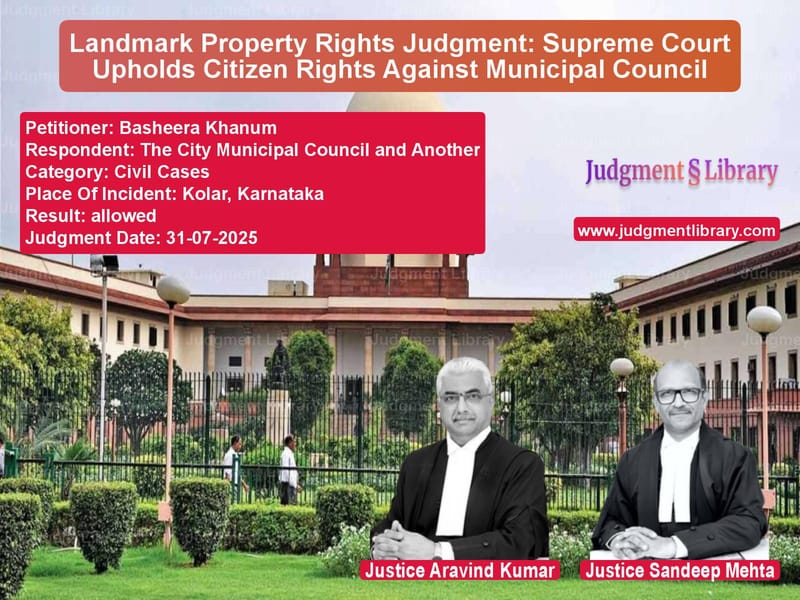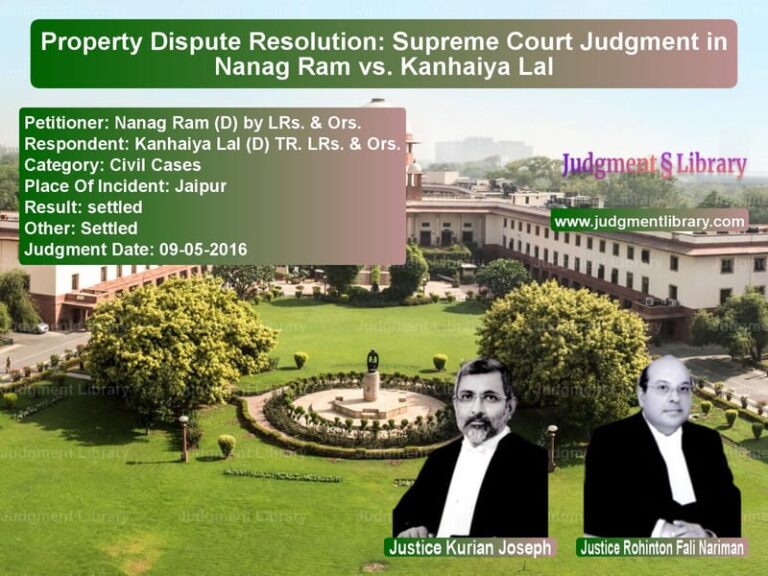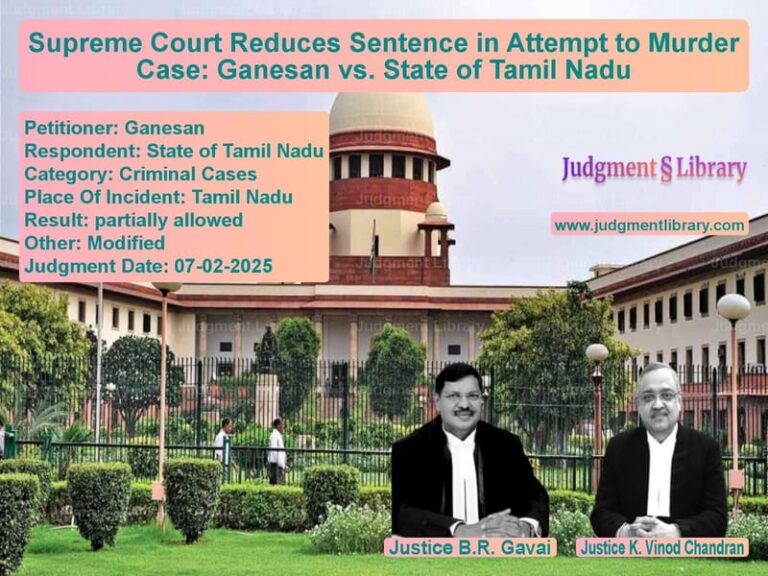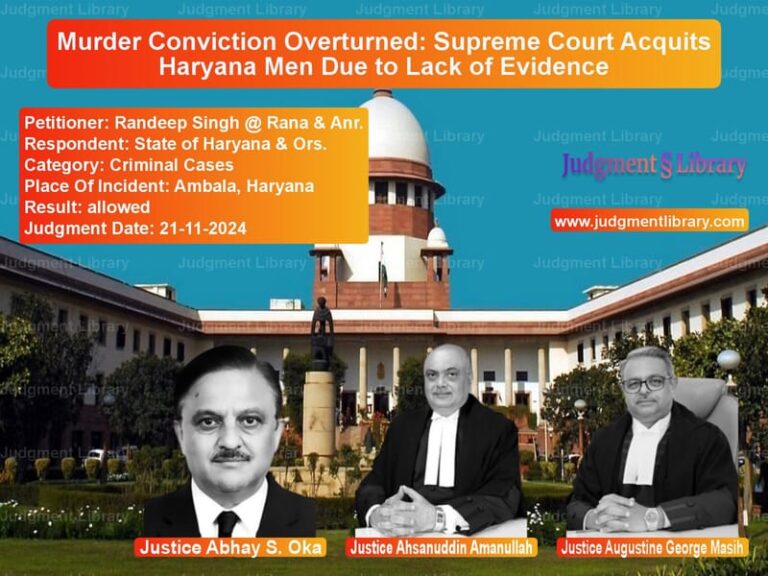Landmark Property Rights Judgment: Supreme Court Upholds Citizen Rights Against Municipal Council
In a significant victory for individual property rights against bureaucratic overreach, the Supreme Court delivered a landmark judgment restoring the ownership rights of Basheera Khanum over a plot of land she had legally purchased through a municipal auction nearly five decades ago. The case, which traveled through multiple courts over three decades, highlights the critical importance of documentary evidence, the sanctity of registered property documents, and the limitations of municipal authorities in arbitrarily canceling legally established property rights.
The dispute began in 1977 when Basheera Khanum successfully bid for plot number 394 in an auction conducted by the City Municipal Council (CMC) of Kolar, Karnataka. She paid Rs. 16,300 as the highest bidder and received a sale certificate in 1980. Meanwhile, T.M. Prabhudeva had purchased adjacent plot number 395 in a 1973 auction. The controversy erupted when a clerical error in Prabhudeva’s 1988 sale deed mistakenly mentioned his plot number as 394 instead of 395, setting off a chain of events that would lead to a 30-year legal battle.
The Legal Journey
The case took its first significant turn when Prabhudeva himself applied for rectification of the plot number error in 1992. The CMC’s Junior Engineer conducted a site inspection and confirmed that plot 394 belonged to Basheera Khanum while plot 395 belonged to Prabhudeva. Based on this report, the CMC passed a Resolution on August 10, 1992, officially correcting the mistake.
However, in a surprising about-face, the CMC passed another Resolution in March 1993, claiming there was no error and that Prabhudeva actually owned plot 394. This Resolution attempted to cancel Basheera Khanum’s sale certificate and allowed interference with her possession of the property she had rightfully owned for years.
Faced with this arbitrary action, Basheera Khanum filed a civil suit seeking declaration of her title and permanent injunction. The trial court ruled in her favor, noting that the CMC had failed to produce original auction records despite court orders. The first appellate court upheld this decision, but the High Court surprisingly reversed these concurrent findings, leading to the Supreme Court appeal.
The Legal Arguments
Before the Supreme Court, Smt. Anjana Chandrashekar, counsel for Basheera Khanum, presented compelling arguments based on statutory provisions and evidentiary principles. She heavily relied on Section 376 of the Karnataka Municipalities Act, 1964, arguing that “a bare reading of sub-section (1) of this provision would make it clear that certified copies of documents in possession of the Municipal Council, and duly certified by the Municipal Commissioner or the Chief Officer, as the case may be, carry the same legal sanctity as the original documents, and are admissible as valid evidence of the existence and contents of the original documents.”
She emphasized that “the trial Court had drawn an adverse inference against respondent No. 1-CMC on account of the fact that the original records pertaining to the auction of 1977 were not produced by it, despite a pertinent direction to that effect.” This crucial aspect, she contended, was completely ignored by the High Court.
The CMC’s counsel supported the High Court’s judgment, arguing that “the claim of the appellant regarding having purchased plot No. 394 in the auction held on 24th June, 1977 was not supported by documentary evidence and hence, the High Court was justified in observing that the appellant failed to substantiate her claim.”
Supreme Court’s Landmark Analysis
The Supreme Court delivered a comprehensive judgment that strongly criticized the High Court’s approach. The Court noted that “the High Court, while exercising jurisdiction under Section 100 of the Code of Civil Procedure, 1908, seems to have undertaken a roving factual inquiry for interfering with the well-reasoned judgment of the trial Court decreeing the suit in favour of the appellant, as affirmed by the first appellate Court.”
The Court was particularly critical of the High Court’s reasoning, stating that “the reasoning assigned by the High Court in the impugned judgment, that the burden lay upon the appellant to fortify the factum of purchase of plot No. 394 in the auction and that she failed to discharge this burden, was recorded in sheer ignorance of the evidence on record and is absolutely perverse.”
The Supreme Court meticulously examined the documentary evidence, noting that “the appellant had placed on record the certified copies of the documents pertaining to the auction proceedings held on 24th June, 1977, in which she was declared to be the highest bidder for plot No. 394. These documents included the money receipts, evidencing the deposit of the bid amount by the appellant, and also the documents pertaining to allotment of plot No. 395 made to respondent No. 2-Prabhudeva.”
Key Legal Principles Established
The judgment established several crucial legal principles that will have far-reaching implications for property disputes across India. On the admissibility of certified municipal documents, the Court affirmed that “these documents are admissible in evidence by virtue of Section 376 of the Karnataka Municipalities Act, 1964.”
Most significantly, the Court delivered a groundbreaking ruling on the cancellation of registered property documents: “We may record that generally and subject to exceptions as may be provided by statute, a valid registered document conveying immovable property cannot be annulled by any procedure other than a civil suit. In any event, cancellation of such a valid document of title by simply drawing a resolution in a board meeting is illegal on the face of the record. Such grossly illegal and high-handed action deserves to be deprecated.”
This principle establishes that municipal bodies cannot arbitrarily cancel legally executed property documents through administrative resolutions, providing crucial protection to property owners against capricious bureaucratic actions.
The Court also reinforced the principle of adverse inference, noting that “the original documents pertaining to the auction were unquestionably in the possession of respondent No. 1-CMC, who failed to bring the same on record despite a specific direction given by the trial Court, thus inviting adverse inference and rightly so.”
Evidence and Factual Findings
The Supreme Court conducted a thorough examination of the evidence, particularly emphasizing the significance of the August 10, 1992 Resolution where the CMC itself had corrected the plot number error. The Court noted that “the fact that respondent No. 2-Prabhudeva had purchased plot No. 395, and not plot No. 394 (which the appellant purchased in the auction dated 24th June 1977), is supported by unimpeachable documentary evidence referred above. The most significant among them is the Resolution dated 10th August, 1992 passed during the board meeting of respondent No. 1-CMC, wherein the number of the plot purchased by respondent No. 2-Prabhudeva was rectified in the documents from 394 to 395.”
The Court also highlighted Prabhudeva’s subsequent conduct, noting that “the assertion of the appellant that pursuant to the rectification in the plot number, respondent No. 2-Prabhudeva entered into an agreement for selling the said plot No. 395, is not denied.” This demonstrated consistent behavior aligning with the corrected plot numbers.
Broader Implications
This judgment has several important implications for property law and administrative law in India. First, it reinforces the legal sanctity of certified copies of municipal documents under statutes like Section 376 of the Karnataka Municipalities Act. Second, it establishes clear limitations on the power of municipal authorities to cancel registered property documents through administrative resolutions. Third, it reaffirms the proper application of burden of proof principles and adverse inference in civil litigation.
The Court’s strong language deprecating “grossly illegal and high-handed action” by municipal authorities sends a clear message that bureaucratic arbitrariness will not be tolerated by the judiciary. The judgment also serves as an important reminder about the restricted scope of interference by High Courts in second appeals under Section 100 of the Civil Procedure Code.
For ordinary citizens like Basheera Khanum, this judgment represents a triumph of justice and a reaffirmation that the legal system can protect individual rights against powerful municipal authorities. The case sets an important precedent for similar property disputes across the country, particularly those involving municipal auctions and challenges to documentary evidence.
The Supreme Court’s final ruling quashing the High Court’s judgment and restoring the trial court’s decree in favor of Basheera Khanum marks the end of a long legal battle and reinforces fundamental principles of property rights, evidentiary law, and administrative accountability that are essential for the protection of citizen rights in a democratic society.
Petitioner Name: Basheera Khanum.Respondent Name: The City Municipal Council and Another.Judgment By: Justice Aravind Kumar, Justice Sandeep Mehta.Place Of Incident: Kolar, Karnataka.Judgment Date: 31-07-2025.Result: allowed.
Don’t miss out on the full details! Download the complete judgment in PDF format below and gain valuable insights instantly!
Download Judgment: basheera-khanum-vs-the-city-municipal-c-supreme-court-of-india-judgment-dated-31-07-2025.pdf
Directly Download Judgment: Directly download this Judgment
See all petitions in Property Disputes
See all petitions in Contract Disputes
See all petitions in Civil Defamation
See all petitions in Specific Performance
See all petitions in Damages and Compensation
See all petitions in Judgment by Aravind Kumar
See all petitions in Judgment by Sandeep Mehta
See all petitions in allowed
See all petitions in supreme court of India judgments July 2025
See all petitions in 2025 judgments
See all posts in Civil Cases Category
See all allowed petitions in Civil Cases Category
See all Dismissed petitions in Civil Cases Category
See all partially allowed petitions in Civil Cases Category







